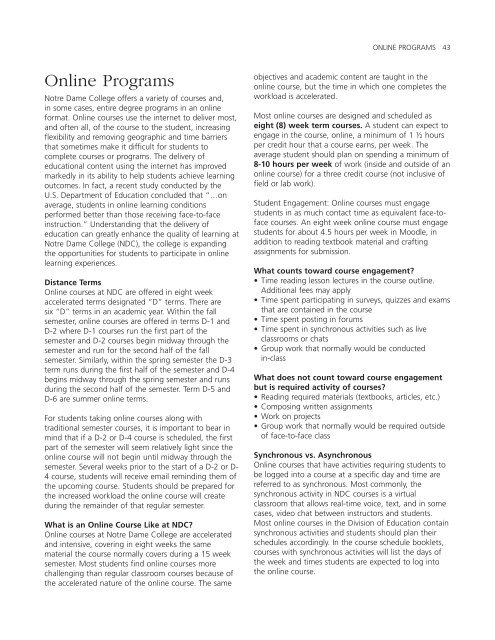NDC Catalog 2007-2008 - Notre Dame College
NDC Catalog 2007-2008 - Notre Dame College
NDC Catalog 2007-2008 - Notre Dame College
You also want an ePaper? Increase the reach of your titles
YUMPU automatically turns print PDFs into web optimized ePapers that Google loves.
Online Programs<br />
<strong>Notre</strong> <strong>Dame</strong> <strong>College</strong> offers a variety of courses and,<br />
in some cases, entire degree programs in an online<br />
format. Online courses use the internet to deliver most,<br />
and often all, of the course to the student, increasing<br />
flexibility and removing geographic and time barriers<br />
that sometimes make it difficult for students to<br />
complete courses or programs. The delivery of<br />
educational content using the internet has improved<br />
markedly in its ability to help students achieve learning<br />
outcomes. In fact, a recent study conducted by the<br />
U.S. Department of Education concluded that “…on<br />
average, students in online learning conditions<br />
performed better than those receiving face-to-face<br />
instruction.” Understanding that the delivery of<br />
education can greatly enhance the quality of learning at<br />
<strong>Notre</strong> <strong>Dame</strong> <strong>College</strong> (<strong>NDC</strong>), the college is expanding<br />
the opportunities for students to participate in online<br />
learning experiences.<br />
Distance Terms<br />
Online courses at <strong>NDC</strong> are offered in eight week<br />
accelerated terms designated “D” terms. There are<br />
six “D” terms in an academic year. Within the fall<br />
semester, online courses are offered in terms D-1 and<br />
D-2 where D-1 courses run the first part of the<br />
semester and D-2 courses begin midway through the<br />
semester and run for the second half of the fall<br />
semester. Similarly, within the spring semester the D-3<br />
term runs during the first half of the semester and D-4<br />
begins midway through the spring semester and runs<br />
during the second half of the semester. Term D-5 and<br />
D-6 are summer online terms.<br />
For students taking online courses along with<br />
traditional semester courses, it is important to bear in<br />
mind that if a D-2 or D-4 course is scheduled, the first<br />
part of the semester will seem relatively light since the<br />
online course will not begin until midway through the<br />
semester. Several weeks prior to the start of a D-2 or D-<br />
4 course, students will receive email reminding them of<br />
the upcoming course. Students should be prepared for<br />
the increased workload the online course will create<br />
during the remainder of that regular semester.<br />
What is an Online Course Like at <strong>NDC</strong>?<br />
Online courses at <strong>Notre</strong> <strong>Dame</strong> <strong>College</strong> are accelerated<br />
and intensive, covering in eight weeks the same<br />
material the course normally covers during a 15 week<br />
semester. Most students find online courses more<br />
challenging than regular classroom courses because of<br />
the accelerated nature of the online course. The same<br />
ONLINE PROGRAMS 43<br />
objectives and academic content are taught in the<br />
online course, but the time in which one completes the<br />
workload is accelerated.<br />
Most online courses are designed and scheduled as<br />
eight (8) week term courses. A student can expect to<br />
engage in the course, online, a minimum of 1 ½ hours<br />
per credit hour that a course earns, per week. The<br />
average student should plan on spending a minimum of<br />
8-10 hours per week of work (inside and outside of an<br />
online course) for a three credit course (not inclusive of<br />
field or lab work).<br />
Student Engagement: Online courses must engage<br />
students in as much contact time as equivalent face-toface<br />
courses. An eight week online course must engage<br />
students for about 4.5 hours per week in Moodle, in<br />
addition to reading textbook material and crafting<br />
assignments for submission.<br />
What counts toward course engagement?<br />
• Time reading lesson lectures in the course outline.<br />
Additional fees may apply<br />
• Time spent participating in surveys, quizzes and exams<br />
that are contained in the course<br />
• Time spent posting in forums<br />
• Time spent in synchronous activities such as live<br />
classrooms or chats<br />
• Group work that normally would be conducted<br />
in-class<br />
What does not count toward course engagement<br />
but is required activity of courses?<br />
• Reading required materials (textbooks, articles, etc.)<br />
• Composing written assignments<br />
• Work on projects<br />
• Group work that normally would be required outside<br />
of face-to-face class<br />
Synchronous vs. Asynchronous<br />
Online courses that have activities requiring students to<br />
be logged into a course at a specific day and time are<br />
referred to as synchronous. Most commonly, the<br />
synchronous activity in <strong>NDC</strong> courses is a virtual<br />
classroom that allows real-time voice, text, and in some<br />
cases, video chat between instructors and students.<br />
Most online courses in the Division of Education contain<br />
synchronous activities and students should plan their<br />
schedules accordingly. In the course schedule booklets,<br />
courses with synchronous activities will list the days of<br />
the week and times students are expected to log into<br />
the online course.



